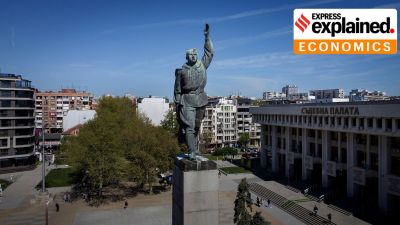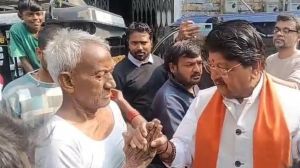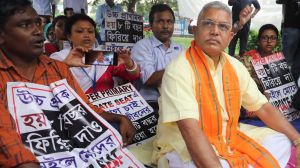Topsy-turvy reforms
As a fully paid-up member of the urban bourgeoisie, whose political roots happen to lie, however, in a rural constituency, my personal inc...

As a fully paid-up member of the urban bourgeoisie, whose political roots happen to lie, however, in a rural constituency, my personal inclinations lead me to spending about 20 days every month in the company of the metropolitan elite and my political vocation to about 10 days every month in the Other India. I am struck by how enthused the rich and upward-mobile are about economic reforms. And how indifferent the poor and stagnant are to what grabs the CII where it lives.
I must emphasise there is little opposition in Mayiladuturai to reforms. I would go so far as to wager there is none. But as a practising politician, I have to acknowledge that any attempt to make reforms the centre-piece of my electoral platform, or even the subject matter of a street-corner speech, would be to bewilder, and then lose, my little audience. They would not know what I was talking about. Or, at best, wonder why I am talking about it. The urban poor too seem to suffer the same sense of alienation from the on-going economic policy revolution which will, it is claimed, definitively define the line of demarcation between the bad old days of 20th century socialism and the coming glories of 21st century market globalisation.
Which is, perhaps, why the two bi-ggest names associated with Indian economic reforms both came a cropper in the last Lok Sabha elections 8211; one from a north Indian urban metropolis, the other from a remote ag-ro-based southern vastness. I do not for a moment believe they were defeated by their reforms. It is just that what has made theirs household na-mes in Dalal Street and Davos is of little electoral relevance, whether in South Delhi or Sivaganga. Why?
I have been reading two short pieces in conjunction which seem to hold the possibilities of an explanation: Montek Singh Ahluwalia8217;s IFFCO Nehru Memorial lecture and Ashutosh Varshney8217;s contribution to quot;India in the Era of Economic Reformsquot; OUP, 1999. Prof. Varshney, of Harvard and Notre Dame, is among the brightest of our younger crop of political scientists; Montek, of course, is Montek. Varshney, pro-reform, speculates on why economic reforms are such a dud subject in the politics of India8217;s democracy; Montek, of co-urse, has the self-assurance of the alchemist who has discovered the secret of turning clay into gold.
Reforms have been pushed where they ha-ve affected the least nu-mber of people. The le-ast number is always the best-off and the wannabe better-off. So, reforms are the main subject of political discourse in that section of society which has the lowest number of votes. As Varshney stresses, quot;Reforms that touch, directly or primarily, elite politics have gone the farthestquot;; reforms that would most co- ncern mass politics have been quot;completely ignored or pursued with less than exemplary policy resolvequot;. Had what has been done dramatically improved standards of living 8211; or even been perceived as holding the potential for doing so 8211; economic reforms might have become central to our politics. They would also have become the central concern if our reforms had led to a slump in living sta-ndards, as in many other countries. But because a decade of reforms has left the bulk of our people untouched, either for good or for ill, reforms are a political yawn.
The fact is that reforms thus far have been concerned more with the promotion of prosperity than with the reduction of poverty. In the decade of reforms, those who have prospered most are the minuscule number of the more wealthy; those who remain more or less where they were are the mass of the poor. A World Ba-nk expert on poverty reduction has shown in The Economic and Political Weekly December 17, 1999 that po-verty reduction and rural growth were hi-gher in the eighties, the last decade of socialism, than in the nineties, the decade of the market. Ahluwalia hints at why: If quot;faster agricultural growth and br-oadbased rural developmentquot; are quot;centralquot; to quot;our strategy for reducing povertyquot;, this requires huge increases in Plan outlays on irrigation, land development, conservation, ag-ri-research, marketing and rural ro-ads. But, alas, quot;the level of these expe-nditures has probably declined in real termsquot; in rural India in the era of economic reforms. The unprecedented increase in government sectorinvestment in rural India, which characterised the eighties, contributed, of course, to the sharp rise we saw in the public debt and the fiscal deficit. To correct this, economic reforms have targ-eted both government revenues and government expenditure. Revenue reforms have most involved the urban rich in ways they have welco-med. Expenditure reforms have most hit the rural poor in ways they have not.
Especially in the second half of the decade of reforms, the management of the fiscal deficit has meant sharply cutting back on government investment while opening the doors to private investment.
The immediate and most meretricious beneficiaries of the encouragement of the private sector have been the upper reaches of the urban middle class; the rural poor have most borne the burden of the sharp cut-back in relative terms on Plan outlays.
To my mind, more important even than the humungous increases required in government investment in rural India, including especially social sector investment, is the reform of the interface between the bureaucracy and the people they are alleged to quot;servequot;. Empowerment 8211; quot;Power to the Peoplequot; 8211; should lie at the heart of reforms. It does not. Because finance ministers in the era of reforms have converted themselves into ministers of corporate affairs. They used to be ministers of poverty alleviation. Now they spend more time 8211; much more time 8211; bailing out imprudent corporate borrowers, rescuing multinationals from ill-considered contracts and facilitating the favoured few than on the concerns and demands of the ru-ral and urban poor. Not only more money, much more money, but mo-ney in the hands of the elected local bodies should be the key issue of economic reforms. It is not. The proof lies in Ahluwalia8217;s lecture to the Indian Farmers Fertiliser Cooperative IFFCO: the word quot;cooperativesquot; does not figure atall and the word quot;farmersquot; but once!
Aiyar is a Congress MP but these views are his own
- 01
- 02
- 03
- 04
- 05































